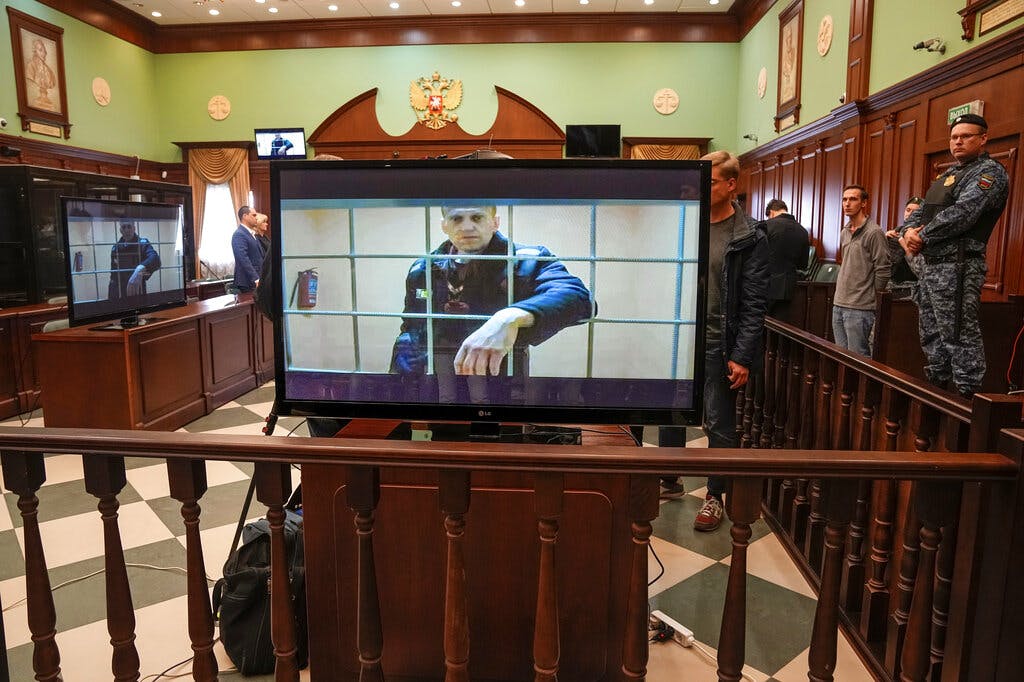Is Putin Trying To Kill Arch-Nemesis Navalny?
Dozens of Russian doctors have courageously signed an open letter urging the Russian strongman ‘to stop abusing’ his quarry.

In the cutthroat world of Moscow politics, it pays to walk a careful line around the strongman at the top, but Alexei Navalny crosses it fearlessly, even in absentia. The opposition leader is now languishing in a Russian jail amid alarming signs that Vladimir Putin, not content with muzzling Russia’s most high-profile proponent of democratic freedoms, is gunning for his arch-rival’s slow expiration.
As the Sun has reported, the 46-year-old is serving a nine-year sentence on what are widely considered to be bogus charges. His having lambasted Mr. Putin’s United Russia organization as a “party of crooks and thieves” in the past has not exactly stood him in the best stead with the keeper of the Kremlin, who at any rate is believed by some to have known much about an incident in 2020 when Mr. Navalny was poisoned by a Novichok nerve agent.
In a series of tweets on Monday that have since gone viral, Mr. Navalny recounted some of the abuses he says he has been experiencing while incarcerated and that could have seriously deleterious consequences for his health. In the first instance, he reported that prison authorities deliberately and repeatedly exposed his cellmate to a medical ward gripped by an influenza epidemic before returning him to shared quarters: “exactly 24 hours later they threw him back in my cell. It seems like they use him as a bioweapon.”
It actually gets worse. Mr. Navalny indicated, also via Twitter, that prison surveillance authorities meted out a punishment of solitary confinement for 15 days for simply having washed his face. According to the tweet, he washed his face at 5:24 in the morning, “while according to the schedule” he was supposed to wake up at 5 a.m. and wash precisely one hour later.
This turn of events raises the possibility that Mr. Navalny will be forced to endure two weeks of solitary confinement in the coldest period of the Russian winter, possibly while suffering from a case of influenza, and with no apparent recourse to medical assistance should the need arise. The Moscow Times reported that this marks Mr. Navalny’s 10th forced stint in solitary confinement since his jail sentence started last year. In a photo posted on social media, Mr. Navalny looked noticeably thinner than usual, and somewhat gaunt.
While Mr. Putin does not run the maximum-security Pokrov prison, it sits a mere 60 miles from Moscow and there is virtually no way that the Russian president is not aware of Mr. Navalny’s condition. In such contempt does Mr. Putin hold his arch-nemesis that will not even refer to him by name. Yet the opposition leader’s millions of supporters know where the venom is coming from and are aware of its toxicity.
That is what led dozens of Russian doctors to courageously sign an open letter on Tuesday to Mr. Putin urging him “to stop abusing” his quarry. “We cannot and do not have the right to look calmly at the deliberate infliction of harm to the health of politician Alexei Navalny,” the letter, which was published on the independent news website Meduza, currently banned in Russia, said.
At last check, 290 doctors had signed the petition to “demand that civilian doctors be allowed to see [Navalny] and, if there is evidence, that he be hospitalized in a civilian hospital for a full examination and treatment.” In the letter, it is also noted that “every citizen of the Russian Federation, in accordance with Article 41 of the Constitution of the Russian Federation, has the right to health care and medical care.”
Whether Mr. Putin will see the letter is unclear. Meduza is said to be backed by another Kremlin critic, Mikhail Khodorkovsky, and though President Macron recently said that Mr. Putin is “not an unpleasant” man, the general consensus is that he is not all that nice either (see Ukraine, invasion of) and certainly brooks no dissent.
In September, the state department spokesman, Ned Price, said that “the United States is deeply concerned by the Russian government’s escalating, arbitrary interference with Aleksey Navalny’s rights” and that “we once again join Navalny’s family, colleagues, and supporters around the world in calling for his immediate release.”
At a time when Russian and Ukraine are engaged in a bitter war and the Kremlin lashes out against Washington on a daily basis, it’s obvious that no amount of American indignation will insulate Mr. Navalny from further harassment behind bars. Yet if anybody at Foggy Bottom could lean in on those who do have Mr. Putin’s ear — Presidents Macron and Erdogan come to mind — to advocate for humane treatment for Alexei Navalny, now would be the time.

